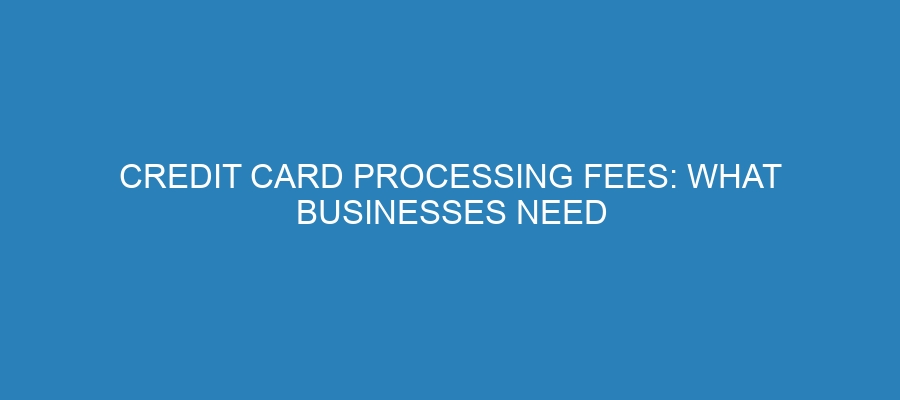In today’s fast-paced digital economy, credit card processing has become an essential aspect for businesses of all sizes—be it a quaint coffee shop or a sprawling e-commerce platform. Accepting credit cards not only enhances customer experience but also significantly boosts sales. However, navigating the labyrinth of credit card processing fees can be a daunting task. In this article, we’ll unravel the complexities, empowering you to make informed decisions for your business.
What Exactly Are Credit Card Processing Fees?
Credit card processing fees are the charges that businesses incur when customers pay using credit cards. These fees can usually be categorized into the following major components:
- Transaction Fees: A fixed fee or a percentage charged for each transaction you process.
- Monthly Fee: A recurring charge that covers the cost of maintaining your merchant account.
- gateway Fees: If you run an online business, you’ll likely pay for a payment gateway to facilitate transactions.
- Chargeback Fees: If a customer disputes a charge and the bank sides with them, you may incur additional fees.
Understanding these various components is crucial. A small business can save a significant amount just by being aware of what each fee entails.
The Hidden Truth About Credit Card Processing Fees
You may think you have a handle on your credit card processing costs, but the truth is that many businesses overlook hidden fees and charges that can eat into profits. Some processing companies charge for unnecessary services or add hidden fees that are not clearly laid out in your contract. This deceptive practice can make it difficult to gauge the true costs of accepting credit cards.
The Impact on your Bottom Line
Think of the processing fees as an uninvited guest at a party. They show up unannounced and take away a portion of the profits you worked hard to build. Depending on the type of business you run, these fees can represent anywhere from 1.5% to 3.5% of each transaction. If you run a high-volume business, this could add up quickly—potentially thousands of dollars every year!
How to Choose the Right Processor
Choosing the right credit card processor can drastically affect the fees you pay and the service you receive. Here are some tips to keep in mind:
-
Compare Offers: Don’t settle for the first offer you receive. Shop around. Resources like PaymentCloud can provide you with valuable comparisons.
-
Read Contracts Carefully: Ensure that you fully understand your contract. Look for hidden fees and clauses that could cost you money down the line.
-
Ask About Interchange Pricing: This is the fee set by credit card networks (like Visa or MasterCard) and varies based on transaction types. Understanding this can help you negotiate better rates.
-
Seek Educated Advice: It never hurts to consult an expert. Companies such as Payminate.com specialize in helping businesses navigate the complexities of credit card processing.
Common Mistakes to Avoid
While diving into credit card processing, businesses often make costly errors. Here are some common pitfalls to avoid:
-
Not Negotiating Fees: Many businesses settle for the first quote they receive, believing it’s non-negotiable. Most are open to negotiation—especially if you have a good transaction volume.
-
Ignoring Transaction Limits: Some processors impose transaction limits, which can stifle your operational capacity. Always clarify this before signing up.
-
Failing to Monitor Fees: Make it a habit to regularly monitor your fees. If you notice an uptick, investigate immediately.
FAQs: Your Questions Answered
Q: What is a PCI Compliance Fee?
A: PCI Compliance Fees are charged for ensuring that your business is adhering to security standards set by the Payment Card Industry to protect card information.
Q: Are credit card processing fees tax-deductible?
A: Yes! You can usually deduct credit card processing fees as a business expense on your tax return.
Q: How can I reduce transaction fees?
A: You can reduce transaction fees by batching transactions, enforcing minimum purchase amounts, or using a payment processor that offers lower fees.
Q: Is it worth it for small businesses to accept credit cards?
A: Absolutely! Accepting credit cards can increase sales and improve customer satisfaction. The slight fees can pale in comparison to the business you could gain.
Q: What should I do if I experience a chargeback?
A: Contact your payment processor immediately to dispute the chargeback. It’s essential to have proper documentation to support your case.
Conclusion: Don’t Leave Money on the Table!
Credit card processing fees are an unavoidable aspect of running a modern business, but ignorance is not bliss. By understanding the ins and outs of these fees, you can make informed choices that will save your business money and improve your bottom line.
If you’re overwhelmed by the complexities of merchant processing or just want to ensure you’re getting the best deal, don’t hesitate to reach out to the experts at Payminate.com. They specialize in merchant processing solutions tailored to fit your unique business needs. Take action today to optimize your credit card processing and keep that uninvited guest at bay!

